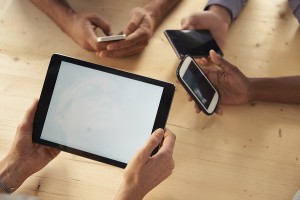Touch-Screens Training Our Minds with Our Thumbs

It’s been brought to the forefront before, the dependent nature developed through constant smartphone and social media usage, but it’s also come to light that using touch-screens has a way of actually re-shaping the way our brain works, and continually using our thumbs may re-shape our minds.
The flexibility of the human brain and how it adapts to repetitive gestures has been previously tested in multiple contexts. Scientists have focused on the effects experienced by musicians and gamers caused by their continuous hand motions.
Now neuroscientists from the University of Zurich and ETH Zurich believe smartphones and the use of touch screens have presented another opportunity to understand how everyday life and our habits can mold the human brain on a huge scale, and they have drawn some interesting ideas from a recent study.
Study on Touch Screens
This has quickly become the age of hand-held-device life. As smartphone growth has seen people using their fingers in a completely new way, the thumb is the prime suspect since it is used typically every day, multiple times a day, to communicate and access the wide world of the internet. The very design of the technological devices we use almost every waking moment means that with all the things we are doing with our thumbs on our phones, there is data being recorded and stored for analyzing, which provides neuroscientists extensive information to work with.
In a recent study, experts took a look at these records to study how the everyday actions we habitually repeat on our phones effects our mind. One of the study’s lead authors, Arko Ghosh stated,
“What this means for us neuroscientists is that the digital history we carry in our pockets has an enormous amount of information on how we use our fingertips (and more).”
Examining EEG
In order to connect brain activity to the digital data and history, the researchers relied on using electroencephalography (EEG) to examine how regular smartphone users responded in tests compared to those who use older-style feature phones.
Each set of phone users had their brain response to various mechanical touches recorded. Of course the major focus was placed on the thumb, forefinger, and middle finger being the most commonly utilized of our ‘digits’ to go digital.
Electrical brain activity was enhanced in those who were using smartphones when each of the three fingers was being touched. The intensity of phone use was also qualified and logged based on the battery logs of the phones, which was found to be directly proportional to the level of activity in the cortex.
The Thumb Teaching the Brain
But that’s not even the tip of the iceberg, or should I say the tip of the thumb. The study found that the thumbs very tip was even found to be sensitive to day-to-day fluctuations in phone use. More activity was observed in the brain when less and less time had elapsed between the periods of intense touchscreen use.
How is this really making any difference? Well the sensitivity of the brain to this activity means the repetitive movements made by our thumbs as they go to work on our smartphone touch screen to text, tweet, share and explore is continually reshaping the sensory processing from our hands, and that sensory can be consistently adjusted on demand when we are using our phones.
The researchers in this study believe this is enough evidence to suggest that the contemporary brain is continuously shaped by the use of personal digital technology. So as we send smiley faces and obsess over memes and status’, we are stimulating and rewiring our brains.
The almighty thumbs that have become more and more of our primary means of expression are likely to have become reorganized by our brains to relay an enhanced sensory representation through the use of touch screens, according to the study. Essentially we have put ourselves in a position where our thumbs are teaching our brains, and our brains are putting more expectations into the ways the thumbs function.
What influence would this have considering that some already suspect our smartphones have become another intense addiction, and the many platforms, apps and games included have been designed to keep us addicted to our smartphones? Is the fact that many apps and games are designed to become habit forming going to have an effect on how the brain is re-creating itself?
While technology is changing our minds for us, we see that compulsive behaviors are becoming more of an issue as we adapt to rely on instant gratifications. This predisposition to addiction can too often relate to drugs and alcohol abuse, and sometimes we don’t even notice how our addictive habits work together for the perfect storm to keep our minds sick. If you or someone you love is struggling with substance abuse or addiction, please call toll-free 1-800-777-9588
